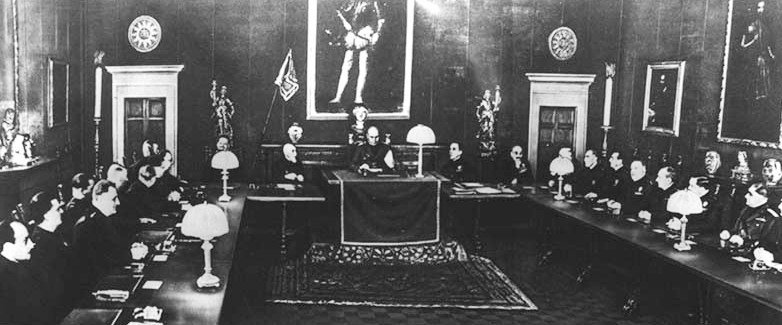|
Sabato Fascista
''Sabato fascista'' ("Fascist Saturday") was established by the Italian Fascist Grand Council on 16 February 1935. Italians were expected to use Saturday afternoons engaged in cultural, sporting, paramilitary and political activities.Tracy H. Koon, ''Believe, Obey, Fight: Political Socialization of Youth in Fascist Italy, 1922–1943'' (Chapel Hill: University of North Carolina Press, 1985), p. 112. According to Tracy H. Koon, this scheme failed as most Italians preferred to spend Saturday as a day of rest. The Secretary of the National Fascist Party, Achille Starace Achille Starace (; 18 August 1889 – 29 April 1945) was a prominent leader of Fascist Italy before and during World War II. Early life and career Starace was born in Sannicola, province of Lecce, in southern Apulia. His father was a wine and oi ..., repeatedly complained about Italians' lack of participation. Notes {{Fascism Italian Fascism ... [...More Info...] [...Related Items...] OR: [Wikipedia] [Google] [Baidu] |
Fascist Italy (1922–1943)
The Kingdom of Italy was governed by the National Fascist Party from 1922 to 1943 with Benito Mussolini as Prime Minister of Italy, prime minister. The Italian Fascism, Italian Fascists imposed Authoritarianism, authoritarian rule and crushed political and intellectual opposition, while promoting economic modernization, traditional social values and a rapprochement with the Roman Catholic Church. According to Payne (1996), "[the] Fascist government passed through several relatively distinct phases". The first phase (1922–1925) was nominally a continuation of the parliamentary system, albeit with a "legally-organized executive dictatorship". The second phase (1925–1929) was "the construction of the Fascist dictatorship proper". The third phase (1929–1934) was with less interventionism (politics), interventionism in foreign policy. The fourth phase (1935–1940) was characterized by an aggressive foreign policy: the Second Italo-Ethiopian War, which was launched from Italian ... [...More Info...] [...Related Items...] OR: [Wikipedia] [Google] [Baidu] |
Grand Council Of Fascism
The Grand Council of Fascism (, also translated "Fascist Grand Council") was the main body of Mussolini's Fascist government in Italy, that held and applied great power to control the institutions of government. It was created as a body of the National Fascist Party in 1922, and became a state body on 9 December 1928. The council usually met at the Palazzo Venezia, Rome, which was also the seat of the head of the Italian government. The Council became extinct following a series of events in 1943, in which Benito Mussolini was voted out of the Prime Ministry of Italy. Powers of the Council Essentially, the council held these powers: *The power to elect the Fascist Party deputies, the nomination for the Party Secretary and other party leaders, the approval of the party statutes and the power regarding the party's policy. *The power to elect the Crown's line of succession including the choice of the heir to the throne, the right of the crown, the power to choose possible successor ... [...More Info...] [...Related Items...] OR: [Wikipedia] [Google] [Baidu] |
National Fascist Party
The National Fascist Party ( it, Partito Nazionale Fascista, PNF) was a political party in Italy, created by Benito Mussolini as the political expression of Italian Fascism and as a reorganization of the previous Italian Fasces of Combat. The party ruled the Kingdom of Italy from 1922 when Fascists took power with the March on Rome until the fall of the Fascist regime in 1943, when Mussolini was deposed by the Grand Council of Fascism. It was succeeded, in the territories under the control of the Italian Social Republic, by the Republican Fascist Party, ultimately dissolved at the end of World War II. The National Fascist Party was rooted in Italian nationalismStanley G. Payne. A History of Fascism, 1914–1945. p. 106.Roger Griffin, "Nationalism" in Cyprian Blamires, ed., ''World Fascism: A Historical Encyclopedia'', vol. 2 (Santa Barbara, California: ABC-CLIO, 2006), pp. 451–53. and the desire to restore and expand Italian territories, which Italian Fascists deemed nece ... [...More Info...] [...Related Items...] OR: [Wikipedia] [Google] [Baidu] |
Achille Starace
Achille Starace (; 18 August 1889 – 29 April 1945) was a prominent leader of Fascist Italy before and during World War II. Early life and career Starace was born in Sannicola, province of Lecce, in southern Apulia. His father was a wine and oil merchant. Starace attended the Lecce Technical Institute and earned a degree in accounting. In 1909 he joined the Italian Royal Army (''Regio Esercito'') and by 1912 had become a second lieutenant (''sottotenente'') of the ''Bersaglieri''. A dedicated bellicist, he entered singlehanded in a brawl with pacifist demonstrators at the Biffi Cafe in Milan in August 1914 and gained quite a reputation by this action. Seeing action during World War I, Starace was highly decorated for his service, winning one Silver Medal of Military Valor plus four bronze. After the war, he left the army and moved to Trento, where he first came into contact with the growing Fascist movement. He also joined the Freemason lodge ''La Vedetta'' ("The Sentinel") in ... [...More Info...] [...Related Items...] OR: [Wikipedia] [Google] [Baidu] |
